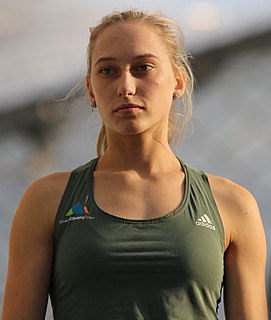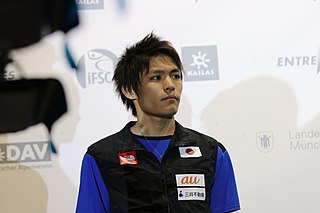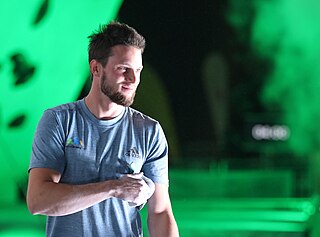
Shauna Coxsey is an English professional rock climber. She is Britain's most successful climber, having won the IFSC Bouldering World Cup Season in 2016 and 2017.

Alexey Rubtsov is a professional rock climber. He has participated in the bouldering competitions and won the world climbing championships in bouldering in 2009. He won the 9th edition of the Melloblocco competition in 2012.

The IFSC Climbing World Cup is a series of climbing competitions held annually and organized by the International Federation of Sport Climbing (IFSC). The athletes compete in three disciplines: lead, bouldering and speed. The number of competitions and venues vary from year to year. The first World Cup was held in 1989, and included only lead climbing events. Speed climbing was introduced in 1998 and bouldering in 1999. For 18 seasons, from 1989 to 2006, World Cups were held under the auspices of UIAA and called UIAA Climbing World Cups. Since 2007, they are held under the auspices of IFSC.

Jongwon Chon is a South Korean sport climber, who won the IFSC Climbing World Cup in 2015 and 2017 in the bouldering discipline.

The bouldering events at the 2015 IFSC Climbing World Cup took place in various countries between May and August of that year. The winners were awarded trophies, the best three finishers received medals, and prize money was awarded to the top six finishers at each stop. At the end of the season an overall ranking was determined based upon points, which athletes were awarded for finishing in the top 30 of each individual event. Akiyo Noguchi won the overall women's World Cup, Jongwon Chon won the overall men's World Cup, and Japan won the National Team Ranking.

The 2016 season of the IFSC Climbing World Cup was the 18th season of the competition. Bouldering competitions were held at the seven stops of the IFSC Climbing World Cup. The bouldering season began on April 15 at the World Cup in Meiringen, and concluded on 12 June at the World Cup in Munich. At each stop a qualifying was held on the first day of the competition, and the semi-final and final rounds were conducted on the second day of the competition. The winners were awarded trophies, the best three finishers received medals, and prize money was awarded to the top six finishers at each stop.

Janja Garnbret is a Slovenian rock climber and sport climber who has won multiple lead climbing and bouldering events.

Tomoa Narasaki is a Japanese professional sport climber and boulderer.

The 2018 season of the IFSC Climbing World Cup was the 20th season of the competition. Bouldering competitions were held at seven stops of the IFSC Climbing World Cup. The bouldering season began on April 13 at the World Cup in Meiringen, and concluded on 18 August with the World Cup in Munich. At each stop a qualifying was held on the first day of the competition, and the semi-final and final rounds are conducted on the second day of the competition. The winners were awarded trophies, and the best three finishers received medals. At the end of the season an overall ranking was determined based upon points, which athletes were awarded for finishing in the top 30 of each individual event. Jernej Kruder won the seasonal title in the men's competition and Miho Nonaka won the women's. Japan won the national team competition.

The 2018 IFSC Climbing World Championships, the 15th edition, were held in Innsbruck, Austria from 6 to 16 September 2018. The championships consisted of lead, speed, bouldering, paraclimbing, and combined events.
Lead climbing competitions at the 2018 IFSC Climbing World Cup were held at seven locations, from 6 July to 28 October 2018. The top three in each competition received medals, and at the end of the season, the overall winners were awarded trophies. The overall winners were determined based upon points, which athletes were awarded for finishing in the top 30 of each individual event. Jakob Schubert won the men's World Cup, Janja Garnbret won the women's World Cup, and Austria won the National Team title.
Lead climbing competitions at the 2017 IFSC Climbing World Cup were held at eight stops. The winners were awarded trophies, and the best three finishers received medals. At the end of the season an overall ranking was determined based upon points, which athletes were awarded for finishing in the top 30 of each individual event. Romain Desgranges won the men's World Cup, Janja Garnbret won the women's World Cup, and Slovenia won the National Team Ranking.
The 2017 IFSC Climbing World Cup was held in 15 locations. Bouldering competitions were held in 7 locations, lead in 8 locations, and speed in 7 locations. The season began on 7 April in Meiringen, Switzerland and concluded on 12 November in Kranj, Slovenia.
The 2018 IFSC Climbing World Cup was held in 14 locations. There were 22 events: 7 bouldering, 7 lead, and 8 speed events. The season began on 13 April in Meiringen, Switzerland, and concluded on 28 October in Xiamen, China.
The 2016 IFSC Climbing World Cup was held in 16 locations. Bouldering, lead and speed competitions were held in 7 locations. The season began on 15 April in Meiringen, Switzerland and concluded on 27 November in Kranj, Slovenia.
The 2015 IFSC Climbing World Cup was held in 13 locations. Bouldering competitions were held in 5 locations, lead in 7 locations, and speed in 5 locations. The season began on 17 May in Central Saanich, Canada and concluded on 15 November in Kranj, Slovenia.
The 2019 season of the IFSC Climbing World Cup was the 21st season of the competition. Bouldering competitions were held at six stops of the IFSC Climbing World Cup. The bouldering season began on April 5 at the World Cup in Meiringen, and concluded on June 8 with the World Cup in Vail. At each stop a qualifying was held on the first day of the competition, and the semi-final and final rounds were conducted on the second day of the competition. The winners were awarded trophies, and the best three finishers received medals. At the end of the season an overall ranking was determined based upon points, which athletes were awarded for finishing in the top 30 of each individual event. Janja Garnbret won the women's and Tomoa Narasaki the men's seasonal title. Japan defended its title in the national teams competition.
The 2019 IFSC Climbing World Cup is held in 12 locations. Bouldering, lead and speed competitions are each held in 6 locations. The season began on 5 April in Meiringen, Switzerland with the first bouldering competition in the season, and will conclude on 27 October in Inzai, Japan, with the last lead climbing competition in the season.
Janja Garnbret first competed in the Climbing World Cup in 2015 in lead discipline at Chamonix, France where she won a silver medal. In 2016, she started competing in bouldering and then won her first gold medal in the World Cup in Chamonix lead event. In 2018, she started competing in speed. In 2019, she became the first person to clean sweep a bouldering season, winning six out of six events.

Chaehyun Seo, is a South Korean professional climber.












